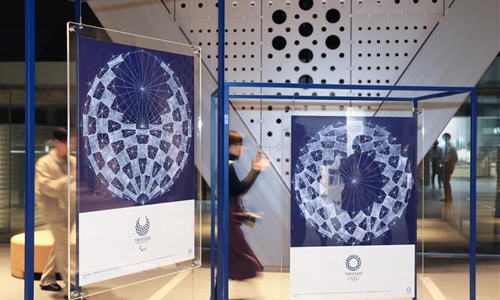HOME >> SPORTS
Tokyo 2020 takes ‘out-of-the-box’ approach with cardboard beds
Source:Reuters Published: 2020/1/9 18:33:41

Photo taken in Tokyo, Japan, Jan. 6, 2020, shows a calligraphy poster exhibited at the preview of Tokyo 2020 Official Art Poster Exhibition. Photo:Xinhua
Athletes competing at the Tokyo 2020 Olympic and Paralympic Games will sleep on bed frames made from recyclable cardboard, with mattresses formed of polyethylene materials that will be reused for plastic products after the Games.The environmentally conscious sleeping arrangements were put on display for the media for the first time on Thursday at a mock apartment in the Tokyo 2020 headquarters, though construction of residential sections of the Olympic and Paralympic village were completed in December.
In all, 18,000 beds will be required at the village, nestled in Tokyo Bay and in sight of the iconic Rainbow Bridge, during the Olympics that begin on July 24. Only 8,000 will be needed for the Paralympics.
At 2.10 meters long, the beds should be suitable for all but the very tallest athletes, and the manufacturer, Airweave, is confident they can bear a weight of around 200 kilograms, which is more than any athlete weighed in Rio in 2016.
Construction of some communal areas of the Olympic village, like the main dining hall and the village plaza, is still underway. After the Games, its apartment units will be sold privately, with prices starting from a little over 50 million yen ($457,000).
The organizers are making a concerted effort to reduce carbon emissions generated by the Games.
All medals will be made from metal extracted from recycled consumer electronics, including about 6.2 million used mobile phones.
The Olympic torch is made from aluminum waste, and the podiums from recycled household and marine plastic waste.
Electricity for the Games will come from renewable sources.
Posted in: OLYMPICS